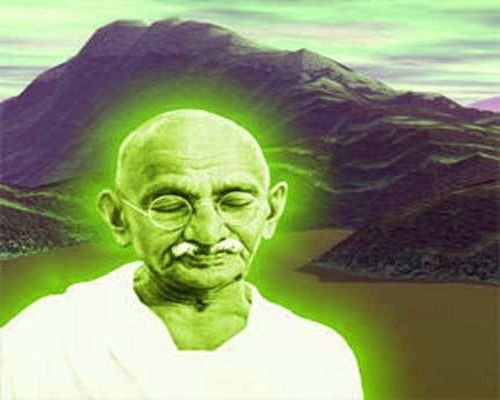The phrase ‘Sustainable Development’ emerged recently with Brundtland Report, 1987 defining it to mean “Meeting the needs of the present generation without compromising the ability of future generations to meet their needs’.
But the idea of sustainability has ever since been present as a philosophy of our Indian polity dominated by thoughts and practices of Mahatma Gandhi.
On the day of his birth anniversary today it shall be a befitting tribute to understand what this great man thought about environment or our surrounding or our ways of development.
 Worldwide web is replete with writings on this political saint. I too surfed the net and sifted through the books in closet and finally laid my hand upon ‘The Writings Of Gandhi’ , edited by Ronald Duncan. Herein, he writes ‘…I am a practical idealist…’
Worldwide web is replete with writings on this political saint. I too surfed the net and sifted through the books in closet and finally laid my hand upon ‘The Writings Of Gandhi’ , edited by Ronald Duncan. Herein, he writes ‘…I am a practical idealist…’
In Mahatma Gandhi’s opinion, in any scheme of development, man should be at the centre. A long term view of development has to be taken, for we owe our debt to prosperity as well.
Man has to make a judicious use of natural resources. The ecological balance should not be disturbed. The objective should not be to build the islands of prosperity in the ocean of poverty; but to raise the level of standard of life and to combat poverty.
Gandhi’s ideas also get reflected in the total value shift in production, consumption, habits and political systems. It places more emphasis on moral responsibility of the individual at the personal, social, national and universal level.
Gandhi believed in Sarvodaya and therefore the welfare of all was the basis for his thinking; hence his community centred approach towards sustainability emphasized on ‘betterment of human life’ and ‘ensuring fulfillment of basic needs of all human needs’. Welfare of the human beings being the ultimate goal by avoiding all sorts of exploitation’s, Gandhi felt that human dignity needs to be established.
Gandhi was an economist of masses and an environmentalist without any structured model. Although he did not give structured model of environmental conservation his ideal of satyagrah evolved into a potent tool for resistance by future environmentalist Sunderlal Bahuguna’s famous Chipko movement.
Gandhi believed that a mutually interdependent cooperative working at the world level shall help in making favourable environment for our people. His formulated the ideal of trusteeship as a concept for Sarvodaya where every member of the society is the trustee of the wealth generated out of the collective efforts of all.
Thus, it denies individual pursuit and collection of wealth and converts it into the wealth of all for a better society. He expected that the trusteeship will result into non-violent and non-exploitative socio-economic relations and development models based on production systems centred around the preservation of nature.
That is where and that is why Gandhi still continues to shine like a guiding star and shall ever will. In Mahatma Gandhi’s words, “Earth provides enough to satisfy every man’s need but not any man’s greed”.
This article is written by “Prateek Kumar Srivastava” (A self taught Environmentalist, Supt. Customs-Central Excise)






